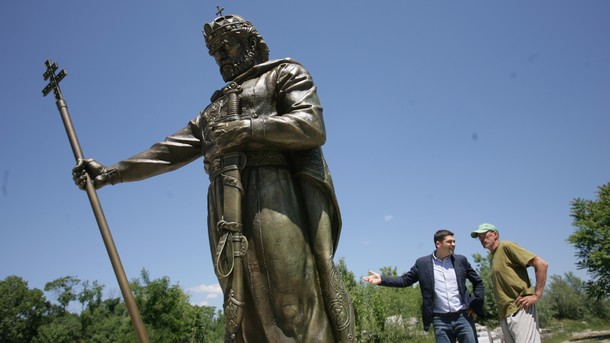
Today, in the center of Sofia, close to St. Sophia Church, a monument was unveiled to Bulgarian Tsar Samuil /997-1014/ on the occasion of the 1000th death anniversary of the great sovereign. He led the Bulgarian state in times of great trouble when the country was engaged in a long, dramatic and unequal warfare with the Byzantine Empire.
Why is Tsar Samuil worthy of a monument in the center of Sofia? Here are the arguments of historian Prof. Plamen Pavlov:
„His contemporaries described him as matchlessly strong, matchlessly brave. An author from 13 c. wrote about him the following: 'the notorious Samuil whom Bulgarians still remember'. At that time there was a cult for the tsar among Bulgarians and he was perceived as a national hero. Famous historians such as Steven Ranciman and Konstantin Jireček compared him to Bulgarian Tsar Simeon the Great /893-927/, not to mention local historians. To sum up: Samuil's place in Bulgarian history is quite important.”
The reign of Tsar Samuil became tragic when 15,000 Bulgarian soldiers held hostage by the Byzantine army were blinded. One in a hundred of them was left one-eyed to lead back home the rest. The sight of the blinded warriors killed the tsar who suffered a stroke. According to Prof. Plamen Pavlov, the attitude to Tsar Samuil and the blinded soldiers is part of the Bulgarian national identity. There is a further reason to dedicate a monument to Tsar Samuil in Sofia:
„We know that Tsar Samuil and his brothers, the Cometopuli, the sons of Comita (Governor) Nikola, came from an aristocratic family related to the dynasty of 9 c. Khan Krum. So, Samuil's ancestry was both ancient and royal. Comita Nikola was governor of Sredets, present-day Sofia. So it is quite possible that Samuil's birthplace was exactly Sofia. On the other hand, the St. Sophia Basilica, the ancient church that has lent its name to the city and is one of the major Christian churches in the Balkans, is intimately linked to Samuil. It is known that in 992 the relics of St. Ivan of Rila were moved from Rila Monastery to St. Sophia. This was most probably the work of the patriarch and of Samuil himself. So, there is indeed a good reason to install his monument in Sofia, close to the Christian shrine of St. Sophia.”
The monument was created by prominent sculptor Alexander Haytov who worked with designers Rosen and Maria Gurkov. Financing for the project has been raised by Bulgarian Memory Foundation chaired by Dr Milen Vrabevski, a businessman and philanthropist. The foundation will support two future monuments of great Bulgarian monarchs. One of them will pay homage to St. Prince Boris I who Christianized Bulgaria. The other one will commemorate Khan Tervel who saved Europe from the Arab invasion in 8 c.
English version Daniela Konstantinova
Every year on February 10, the feast of St. Haralambos , Bishop of Magnesia, is celebrated with special solemnity in a small Bulgarian town in the northernmost part of the country's Black Sea coast . For Shabla and its residents, this is the..
Almost 40 years ago, Bulgarian Orthodox Church communities were established in Western and Central Europe in several cities - Budapest, Munich, Vienna, Stockholm, Malmö, Oslo and Paris. With Bulgaria's accession to the European Union and the expansion..
On February 4, Blagoevgrad will commemorate the 153rd anniversary of the birth of Bulgarian revolutionary Gotse Delchev with a wreath-laying ceremony. The ceremony will take place at 11am in front of the hero's monument on Macedonia Square. Voivode..
Every year on February 10, the feast of St. Haralambos , Bishop of Magnesia, is celebrated with special solemnity in a small Bulgarian town in the..

+359 2 9336 661
